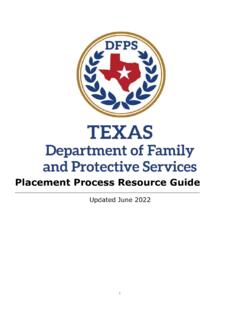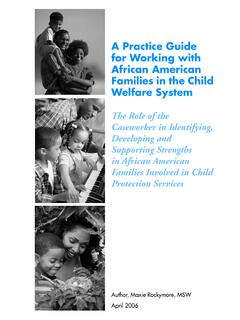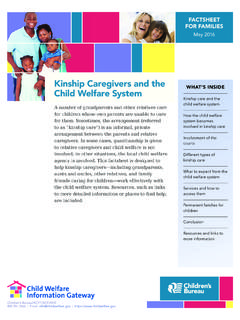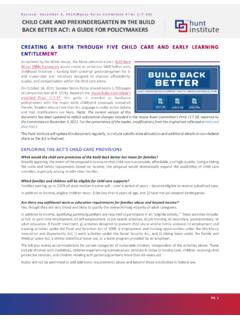Transcription of A Resource Guide for Kinship Caregivers in Arkansas
1 A Resource Guide for Kinship Caregivers in Arkansas What Every Grandparent or Relative Caregiver Needs to Know, When a Parent is Arrested, Incapacitated, or Involved in a Dependency-Neglect Proceeding Table of Contents Caring for Children in Distress .. 3. Arkansas Voices for the Children Left Behind, Inc.. 4. School Enrollment .. 6. Medicaid .. 7. Supplemental Security Income (SSI) .. 7. Social Security Disability (SSD) .. 8. Temporary Employment Assistance (TEA) .. 9. Juvenile Court Dependency / Neglect Proceedings .. 11. Kinship Foster Care .. 14. Guardianship.
2 15. Power of 17. Adoption .. 17. FINS .. 18. State Laws .. 19. Behavior Management Tips .. 19. Transitional Issues for Relative Caregivers .. 21. Phone Numbers for Department of Human Services .. 24. Phone Numbers for Arkansas Department of Workforce Services (ADWS) .. 26. th 2010 5 Edition Written by Arkansas Voices for the Children Left Behind, Inc Reproduction of this publication, in whole or in part, is permitted and encouraged. When reproducing this material, copies should contain the following statement: Reprinted with permission of Arkansas Voices for the Children Left Behind, Inc.
3 , Little Rock, AR.. 1. Foreword Dear Grandparents and Other Relative Caregivers , Arkansas Voices for the Children Left Behind is pleased to provide you with this printed Resource and information Guide for grandparents and other relatives who are caring for their relatives' children when the parents are unavailable or incapacitated. Historically, relatives have always stepped up to care for children in their families, but never to the extent have we now seen occurring, not just in the United States, but worldwide. There are many reasons: Parental incarceration, abandonment, parental death, economic distress, military deployment of the parent(s), and incapacity, such as mental illness, addiction, physical or developmental challenges.
4 Thousands of grandparents and other Kinship caretakers like you are making great sacrifices to keep your family together by offering these children your love and support. Caring for someone else's children is difficult, especially when they are in such distress and you have no time to prepare. You may not know until years later what a difference you have made in their lives. You may receive very little appreciation or thanks for the tremendous amount of work you do and all you give up along the way. Sometimes it will be hard to remember why you took on this responsibility.
5 We are here to help remind you of the importance of what you are doing and the respect you deserve. We know that you are not only invaluable to these children, but also to our community. As you know better than anyone, the effects of being left behind for these children extend far beyond childhood. We hope the information in this Guide will help you understand some of the complicated choices you may face and to find the resources you need. Please do not hesitate to call us for assistance - we offer resources and support groups for children and their caretakers, as you can see in the section about our agency.
6 At the end of this Guide , you will find examples of forms, form letters and petitions you may need to fill out during the process of becoming a relative caregiver. You are not alone on this journey. Best wishes to each of our readers. Dee Ann Newell and Paula Pumphrey Co-Founders Arkansas Voices for the Children Left Behind, Inc. Box 251002, Little Rock, AR 72225. Toll Free ( ). Mission: Justice for children left behind, including social, racial, economic, educational, and family justice. Serving children left behind since 1994. A SPECIAL THANK YOU TO ARISTOTLE FOR OUR WEBSITE.
7 The board members of Arkansas Voices for the Children Left Behind wish to thank the owner, Marla Johnson Norris, and the staff of Aristotle, a national internet provider company, based in Arkansas , for their donation of the website for Arkansas Voices, and for their investment of time, energy, and concern for the children left behind in our state of Arkansas . We are most indebted for your support and services and hope that our web presence and this Resource Guide will better serve all of those who seek to better practices and policies when children are left behind.
8 January 2010. 2. Helpful Suggestions from Several Relative Caregivers Caring for Children in Distress The situation you are in as a caregiver for a child is hard on everyone, regardless of the circumstances. For both you and the child, it means a major upheaval in your everyday lives. Just as you have time to concentrate on yourself instead of taking care of others, you suddenly find yourself parenting a young child, or children, again. For whatever reason the children you are caring for are not with their parents, they are experiencing a tidal wave of emotions, such as a great sense of loss, grief, shame, anger, fears of abandonment and uncertainty.
9 They have no way to make sense of what has happened and are probably unable to manage their feelings. In addition, children often feel they have done something to cause the loss of their parent, leading to an overwhelming sense of guilt. Most likely their emotions will lead to some behavioral problems. One of your most important jobs is to give them permission to talk about what has happened to them and let them express their grief. Their loss needs to be discussed in a way that is age-appropriate. When families keep secrets or do not allow certain topics to be raised, tension builds on both sides.
10 Letting the children and their parents express their feelings, even ones of anger, is an important step to help them begin the healing process. If you raised the grandchild's parent, you may blame yourself, wondering where you went wrong and thinking everything is your fault. You may be feeling overwhelmed and even angry that you've had to start caring for children again just when you thought life would take a different direction. If your child is going to prison, you probably feel very scared for her. Feeling angry and resentful and scared are all normal reactions.





